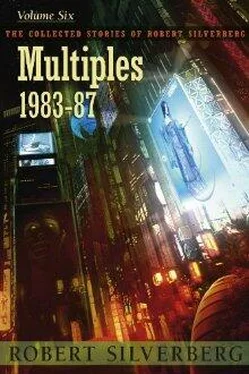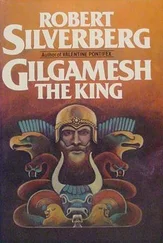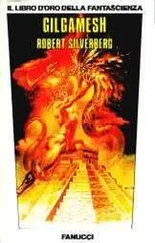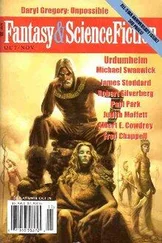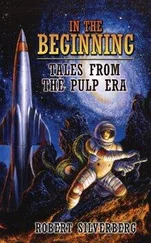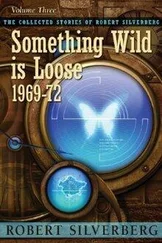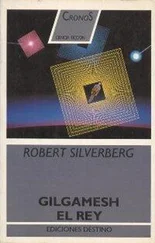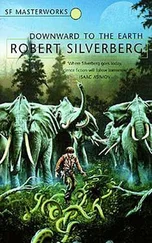Robert Silverberg - Gilgamesh in the Outback
Здесь есть возможность читать онлайн «Robert Silverberg - Gilgamesh in the Outback» весь текст электронной книги совершенно бесплатно (целиком полную версию без сокращений). В некоторых случаях можно слушать аудио, скачать через торрент в формате fb2 и присутствует краткое содержание. Год выпуска: 2011, ISBN: 2011, Издательство: Subterranean Press, Жанр: Фантастика и фэнтези, на английском языке. Описание произведения, (предисловие) а так же отзывы посетителей доступны на портале библиотеки ЛибКат.
- Название:Gilgamesh in the Outback
- Автор:
- Издательство:Subterranean Press
- Жанр:
- Год:2011
- ISBN:978-1-59606-402-7
- Рейтинг книги:5 / 5. Голосов: 1
-
Избранное:Добавить в избранное
- Отзывы:
-
Ваша оценка:
- 100
- 1
- 2
- 3
- 4
- 5
Gilgamesh in the Outback: краткое содержание, описание и аннотация
Предлагаем к чтению аннотацию, описание, краткое содержание или предисловие (зависит от того, что написал сам автор книги «Gilgamesh in the Outback»). Если вы не нашли необходимую информацию о книге — напишите в комментариях, мы постараемся отыскать её.
Gilgamesh in the Outback — читать онлайн бесплатно полную книгу (весь текст) целиком
Ниже представлен текст книги, разбитый по страницам. Система сохранения места последней прочитанной страницы, позволяет с удобством читать онлайн бесплатно книгу «Gilgamesh in the Outback», без необходимости каждый раз заново искать на чём Вы остановились. Поставьте закладку, и сможете в любой момент перейти на страницу, на которой закончили чтение.
Интервал:
Закладка:
“Never could stand his stuff,” said Howard. “Sick crap about a bunch of drunken weaklings. You sure that’s him?”
“Weaklings, Bob?” said Lovecraft in astonishment.
“I read only the one book, about those Americans in Europe who go to the bullfights and get drunk and fool around with each other’s women, and that was all of Mr. Hemingway that I cared to experience. I tell you, H.P., it disgusted me. And the way it was written! All those short little sentences—no magic, no poetry, H.P.—”
“Let’s talk about it some other time, Bob.”
“No vision of heroism—no awareness of the higher passions that ennoble and—”
“Bob—please—”
“A fixation on the sordid, the slimy, the depraved—”
“You’re being absurd, Bob. You’re completely misinterpreting his philosophy of life. If you had simply taken the trouble to read A Farewell to Arms—” Lovecraft shook his head angrily. “This is no time for a literary discussion. Look—look there.” He nodded toward the far side of the room. “One of the emperor’s aides is calling over. Something’s going on.”
Indeed there had been a development of some sort. Yeh-lu Ta-shih seemed to be conferring with four or five aides at once. Gilgamesh, red-faced, agitated, was striding swiftly back and forth in front of the computer bank. Hemingway’s face was still on the screen and he too looked agitated.
Hastily Howard and Lovecraft crossed the room. The emperor turned to them. “There’s been a request for a parley in the field,” Prester John said, “Kublai Khan is on his way over. Dr. Schweitzer will serve as my negotiator. The man Hemingway’s going to be an impartial observer— their impartial observer. I need an impartial observer, too. Will you two go down there too, as diplomats from a neutral power, to keep an eye on things?”
“An honor to serve,” said Howard grandly.
“And for what purpose, my lord, has the parley been called?” Lovecraft asked.
Yeh-lu Ta-shih gestured toward the screen. “Hemingway has had the notion that we can settle this thing by single combat—Gilgamesh versus Enkidu. Save on ammunition, spare the Undertaker a devil of a lot of toil. But there’s a disagreement over the details.” Delicately he smothered a yawn. “Perhaps it can all be worked out by lunchtime.”
It was an oddly assorted group. Mao Tse-tung’s chief negotiator was the plump, magnificently dressed Kublai Khan, whose dark sly eyes gave evidence of much cunning and force. He had been an emperor in his own right in his former life, but evidently had preferred less taxing responsibilities here. Next to him was Hemingway, big and heavy, with a deep voice and an easy, almost arrogant manner. Mao had also sent four small men in identical blue uniforms with red stars on their breasts—“Party types,” someone murmured—and, strangely, a Hairy Man, big-browed and chinless, one of those creatures out of deepest antiquity. He too wore the Communist emblem on his uniform.
And there was one more to the group—the massive, deep-chested man of dark brow and fierce and smouldering eyes, who stood off by himself at the far side—
Gilgamesh could barely bring himself to look at him. He too stood apart from the group a little way, savoring the keen edge of the wind that blew across the field of battle. He longed to rush toward Enkidu, to throw his arms around him, to sweep away in one jubilant embrace all the bitterness that had separated them—
If only it could be as simple as that!
The voices of Mao’s negotiators and the five that Prester John had sent—Schweitzer, Lovecraft, Howard, and a pair of Kara-Khitai officers—drifted to Gilgamesh above the howling of the wind.
Hemingway seemed to be doing most of the talking. “Writers, are you? Mr. Howard, Mr. Lovecraft? I regret I haven’t had the pleasure of encountering your work.”
“Fantasy, it was,” said Lovecraft. “Fables. Visions.”
“That so? You publish in Argosy? The Post?”
“Five to Argosy, but they were westerns,” Howard said. “Mainly we wrote for Weird Tales. And H.P., a few in Astounding Stories.”
“Weird Tales,” Hemingway said. “Astounding Stories.” A shadow of distaste flickered across his face. “Mmm. Don’t think I knew those magazines. But you wrote well, did you, gentlemen? You set down what you truly felt, the real thing, and you stated it purely? Of course you did. I know you did. You were honest writers or you’d never have gone to Hell. That goes almost without saying.” He laughed, rubbed his hands in glee, effusively threw his arms around the shoulders of Howard and Lovecraft. Howard seemed alarmed by that and Lovecraft looked as though he wanted to sink into the ground. “Well, gentlemen,” Hemingway boomed, “what shall we do here? We have a little problem. The one hero wishes to fight with bare hands, the other with—what did he call it?—a disruptor pistol? You would know more about that than I do: something out of Astounding Stories, is how it sounds to me. But we can’t have this, can we? Bare hands against fantastic future science? There is a good way to fight and that is equal to equal, and all other ways are the bad ways.”
“Let him come to me with his fists,” Gilgamesh called from the distance. “As we fought the first time, in the Market-of-the-Land, when my path crossed his in Uruk.”
“He is afraid to use the new weapons,” Enkidu replied.
“Afraid?”
“I brought a shotgun to him, a fine 12-gauge weapon, a gift to my brother Gilgamesh. He shrank from it as though I had given him a venomous serpent.”
“Lies!” roared Gilgamesh. “I had no fear of it! I despised it because it was cowardly!”
“He fears anything which is new,” said Enkidu. “I never thought Gilgamesh of Uruk would know fear, but he fears the unfamiliar. He called me a coward, because I would hunt with a shotgun. But I think he was the coward. And now he fears to fight me with the unfamiliar. He knows that I’ll slay him. He fears death even here, do you know that? Death has always been his great terror. Why is that? Because it is an insult to his pride? I think that is it. Too proud to die—too proud to accept the decree of the gods—”
“I will break you with my hands alone!” Gilgamesh bellowed.
“Give us disruptors,” said Enkidu. “Let us see if he dares to touch such a weapon.”
“A coward’s weapon!”
“Again you call me a coward? You, Gilgamesh, you are the one who quivers in fear—”
“Gentlemen! Gentlemen!”
“You fear my strength, Enkidu!”
“You fear my skill. You with your pathetic old sword, your pitiful bow—”
“Is this the Enkidu I loved, mocking me so?”
“You were the first to mock, when you threw back the shotgun into my hands, spurning my gift, calling me a coward—”
“The weapon, I said, was cowardly. Not you, Enkidu.”
“It was the same thing.”
“Bitte, bitte,” said Schweitzer. “This is not the way!”
And again from Hemingway: “Gentlemen, please!”
They took no notice.
“I meant—”
“You said—”
“Shame—”
“Fear—”
“Three times over a coward!”
“Five times five a traitor!”
“False friend!”
“Vain braggart!”
“Gentlemen, I have to ask you—”
But Hemingway’s voice, loud and firm though it was, was altogether drowned out by the roar of rage that came from the throat of Gilgamesh. Dizzying throbs of anger pounded in his breast, his throat, his temples. He could take no more. This was how it had begun the first time, when Enkidu had come to him with that shotgun and he had given it back and they had fallen into dispute. At first merely a disagreement, and then a hot debate, and then a quarrel, and then the hurling of bitter accusations. And then such words of anger as had never passed between them before, they who had been closer than brothers.
Читать дальшеИнтервал:
Закладка:
Похожие книги на «Gilgamesh in the Outback»
Представляем Вашему вниманию похожие книги на «Gilgamesh in the Outback» списком для выбора. Мы отобрали схожую по названию и смыслу литературу в надежде предоставить читателям больше вариантов отыскать новые, интересные, ещё непрочитанные произведения.
Обсуждение, отзывы о книге «Gilgamesh in the Outback» и просто собственные мнения читателей. Оставьте ваши комментарии, напишите, что Вы думаете о произведении, его смысле или главных героях. Укажите что конкретно понравилось, а что нет, и почему Вы так считаете.
